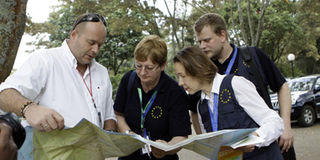Observers give poll thumbs-up

PHOTO/STEPHEN MUDIARI European Union election observers look at a map minutes before they were dispatched to various counties in the country, in Nairobi, February 3rd, 2013. Three foreign observer missions have given the country a thumbs-up for conducting a peaceful, transparent and credible election.
What you need to know:
- African, European Unions and Commonwealth missions urge speedy release of results
Three foreign observer missions have given the country a thumbs-up for conducting a peaceful, transparent and credible election.
The African Union, European Union and Commonwealth observer groups said they were satisfied with the manner in which voting and counting took place in most of the places they visited.
In their preliminary reports released separately, the teams, however, noted a few hitches as Kenyans continued to eagerly await the final tally of the presidential vote.
The AU was particularly concerned by the large number of rejected votes, many of which may have been due to inadequate voter education.
Former Mozambique President Joaquim Chissano headed the AU group. He said that even though they recognised the role played by the Independent Electoral and Boundaries Commission in conducting voter education, it was simply “not fully satisfactory”.
Asked whether the rejected ballot papers should be included in the final count, which determines the winner of the presidential poll, Mr Chissano said the law must be followed at all times.
The Commonwealth, on the other hand, said the failure of the electronic voter transmission process should not delay the release of the official presidential results as this may cause anxiety among Kenyans.
Former Botswana President Festus Mogae, who heads the group, said the chaotic political primaries created unnecessary pressure on the electoral commission, leading to challenges especially with ballot printing.
“The Independent Electoral and Boundaries Commission faced a difficult task in organising the election, not least because in a short period of time, it determined the boundaries, acquired a brand new biometric voter registration system and prepared for six polls on a single day,” Mr Mogae said.
Legal disputes
He said any legal disputes regarding the elections should be resolved through the courts, adding that the Independent Electoral and Boundaries Commission should ensure clarity and complete the electoral process in a transparent and timely manner.
The EU passed a vote of confidence in the March 4 polls, saying Kenyans had demonstrated a strong commitment to democracy.
The Election Observation Mission said the electoral commission had overcome several difficulties to conduct peaceful and democratic elections.
“I was pleased to see that Kenyan voters’ determination was strong enough to defeat even the longest queues,” the mission’s chief observer, former Slovenia Prime Minister Alojz Peterle, said.
“Kenyans stood up for peace and for their rights on Monday. Their commitment to exercising their rights sets a positive example not only to the region, but to the world,” he added.
The mission, however, said it was disappointed with the participation of women in the elections, noting it was low.
The AU sent 29 teams of 60 observers to 482 polling stations in 130 constituencies while the Commonwealth sent 23 observers to seven regions.




